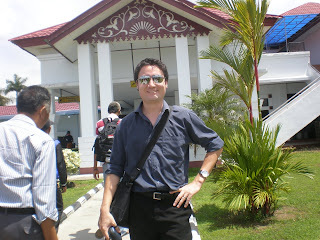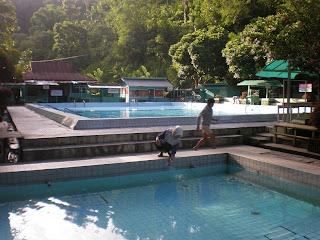Being part of the Public Participation Subdivision, it was all hands on deck for the annual “16 Days of Activism against Gender Violence” campaign which ran from November to December. Part of the campaign included Komnas Perempuan supporting regional events held by partner organisations around the country. I (Nat) was fortunate enough to accompany one of the commissioners (Neng Dara) to the province of Bengkulu in Sumatra from 24 to 27 November 2011.

Arrival at the Bengkulu airport

The house in Kota Bengkulu in which Sukarno was placed under restricted residence 1938-1942

Although a large city, the streets of Kota Bengkulu are relatively quiet
We got straight into it as soon as we landed in the capital city (also called Bengkulu or Kota Bengkulu) on the Thursday with a media audience with local print and television media, our faces featured in the next day’s paper. Our hosts, Cahaya Perempuan Women’s Crisis Centre were gracious enough to drive us around and made life easy.

Sunset on Pantai Panjang
Friday morning saw us attending a public dialogue with civil servants and important government officials who in my view demonstrated a shallow understanding of human rights. There was even an outspoken professor who called it “violence against men” when women wear skimpy clothes because it makes it difficult for men to “resist”.
Being the only “white” person there was like being a celebrity. Even though I was there to assist Neng Dara, everyone wanted photos with me. I even got my name mentioned in the VIP greetings they do at the beginning of speeches.

The clean mountain air of Curup
That afternoon we packed up and made our way to Curup the more rural regency of Rejang Lebong. Driving up into the mountains along windy roads really reminded me of going to Tambunan in Sabah – it was strangely familiar yet unfamiliar. Curop is quite high above sea level and I was looking forward to a more temperate clime. Once there we went straight to Bupati’s (regent) official residence. It was a palatial mansion that was probably unnecessary for the equivalent of a rural mayor. We were greeted in the official reception hall and I was seated next to the man himself. Somehow they had got wind that an Australian was coming and so they had prepared two interpreters! Being some of the few people who could speak English in town, they turned out to be local high school students. I felt that I had let them down when they realised I spoke fluent Indonesian. I also felt awkward that I was receiving so much unwarranted attention. Following food and drink and general chit chat to my added suprise I discovered that Neng Dara, an important lady who was the former head of Cahaya Perempuan and myself would actually staying in the “palace” as VIPs that night. Everyone else had to stay in a hotel. Somehow I also found myself in a suite of sorts. I had my own private lounge room, four-posted bed and spa. Typical of Indonesia I didn’t have a sink or toilet paper though. By some stroke of further weirdness, the other VIP lady who was a founder of Cahaya Perempuan used to live in this house 6 years ago when her husband was randomly bupati of this regency! She still knew some of the servants by name and told me that my room was where they used to house visiting governors and other big shots. Wow the things you get for being a white person.

Arrival at the Bengkulu airport

The house in Kota Bengkulu in which Sukarno was placed under restricted residence 1938-1942

Although a large city, the streets of Kota Bengkulu are relatively quiet
We got straight into it as soon as we landed in the capital city (also called Bengkulu or Kota Bengkulu) on the Thursday with a media audience with local print and television media, our faces featured in the next day’s paper. Our hosts, Cahaya Perempuan Women’s Crisis Centre were gracious enough to drive us around and made life easy.

Sunset on Pantai Panjang
Friday morning saw us attending a public dialogue with civil servants and important government officials who in my view demonstrated a shallow understanding of human rights. There was even an outspoken professor who called it “violence against men” when women wear skimpy clothes because it makes it difficult for men to “resist”.
Being the only “white” person there was like being a celebrity. Even though I was there to assist Neng Dara, everyone wanted photos with me. I even got my name mentioned in the VIP greetings they do at the beginning of speeches.

The clean mountain air of Curup
That afternoon we packed up and made our way to Curup the more rural regency of Rejang Lebong. Driving up into the mountains along windy roads really reminded me of going to Tambunan in Sabah – it was strangely familiar yet unfamiliar. Curop is quite high above sea level and I was looking forward to a more temperate clime. Once there we went straight to Bupati’s (regent) official residence. It was a palatial mansion that was probably unnecessary for the equivalent of a rural mayor. We were greeted in the official reception hall and I was seated next to the man himself. Somehow they had got wind that an Australian was coming and so they had prepared two interpreters! Being some of the few people who could speak English in town, they turned out to be local high school students. I felt that I had let them down when they realised I spoke fluent Indonesian. I also felt awkward that I was receiving so much unwarranted attention. Following food and drink and general chit chat to my added suprise I discovered that Neng Dara, an important lady who was the former head of Cahaya Perempuan and myself would actually staying in the “palace” as VIPs that night. Everyone else had to stay in a hotel. Somehow I also found myself in a suite of sorts. I had my own private lounge room, four-posted bed and spa. Typical of Indonesia I didn’t have a sink or toilet paper though. By some stroke of further weirdness, the other VIP lady who was a founder of Cahaya Perempuan used to live in this house 6 years ago when her husband was randomly bupati of this regency! She still knew some of the servants by name and told me that my room was where they used to house visiting governors and other big shots. Wow the things you get for being a white person.
With my 'translators' at the Bupati's residence in Curup

In true Indonesian style, the spa in my suite in the Bupati's residence had been turned into a water container
The next day’s event went quite well. I’m beginning to understand though that Indonesian officials will generally open an event but do not stay for it. As soon as the bupati gave his speech, the prayer was read and he left. Half the other officials in the audience walked out with him, leaving lower-ranking officials and government servants (mostly women) to remain.
At the public dialogue in Curup
Overall despite the unwarranted attention, it was a great experience. By starting my days early, I managed to squeeze in quite a bit of sightseeing and I made some great friends. Bengkulu is interesting as despite being beautiful (and far cleaner than most of Java), is not really a tourist destination. The province was a former British colony until 1824 when it was traded to the Dutch for Malacca (and Singapore). Bengkulu still has the marvellously preserved Fort Marlborough which I visited and stunning beaches. I also made it to the Suban hot springs while in the mountains. Though apparently the capital has a population nearing 1 million people, there are few high-rise buildings and shopping centres, giving it the rural feel of a small town that’s just very spread out. I didn’t encounter any fast food outlets and roads were basic at best. It was refreshing to breath the unpolluted air!
The waterfall at Suban

The heated pool at the Suban hotsprings was empty at 6am
Fort Marlborough in Kota Bengkulu



